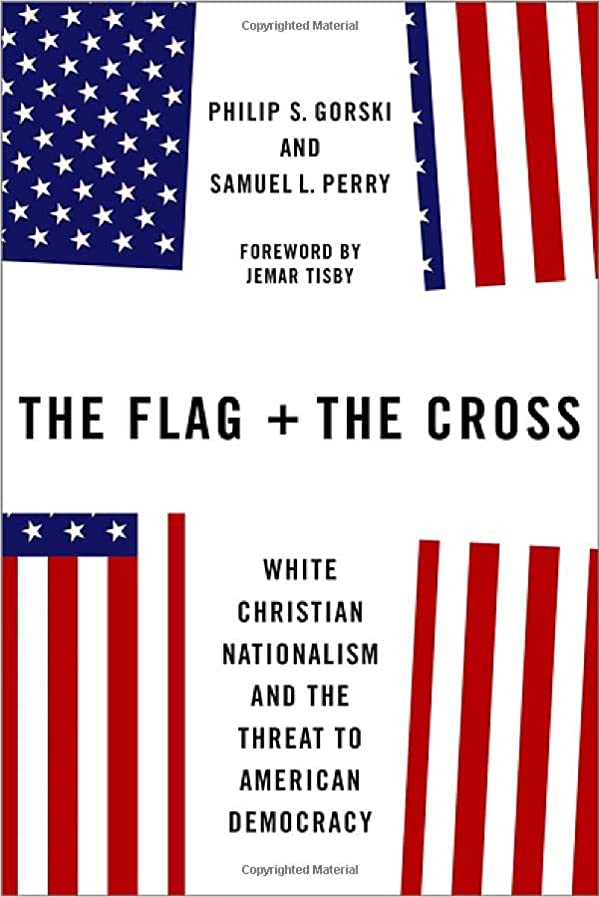
The Flag and the Cross: White Christian Nationalism and the Threat to American Democracy
by Philip Gorski and Samuel Perry
Excerpt from The Flag and the Cross: White Christian Nationalism and the Threat to American Democracy
The chaos of the Capitol insurrection on January 6, 2021, was bewildering for many. The riot was also a riot of images: a wooden cross and a wooden gallows; Christian flags and Confederate flags; “Jesus Saves” and “Don’t Tread on Me” banners; button-down shirts and bullet-proof vests. But these confusing — and even seemingly contradictory — symbols are part of an increasingly familiar ideology: “white Christian nationalism.”
White Christian nationalism is one of the oldest and most powerful currents in American politics. But until the insurrection, it was invisible to most Americans. It was invisible to most conservative white Christians, because it has been the water they swim in and the air they breathe. It was invisible to most secular progressives, because they live in a bubble of their own in which white Christian nationalism seems “fringe.”

White Christian Nationalism and the Threat to American Democracy (Oxford University Press 2022)
But that bubble was burst by the Capitol insurrection. It was like the eruption of a volcano. The pressure had been building for decades. The election simply sent it shooting toward the surface. The buildup was largely the result of slow-moving demographic and cultural change. The U.S. population is becoming less white and more secular. The nation has become less powerful and more unequal. The tectonic plates of history were colliding with each other.
What is white Christian nationalism? A “deep story” about America’s past and a vision of its future. It includes cherished assumptions about what America was and is, but also what it should be. White Christian nationalism’s “deep story” goes something like this: America was founded as a Christian nation by (white) men who were “traditional” Christians. Its founding documents were based on “Christian principles.” The United States is blessed by God, which is why it has been so successful; and the nation has a special role to play in God’s plan for humanity. But these blessings are threatened by cultural degradation from “un-American” influences both inside and outside our borders.
What makes deep stories “stories” is that they function like a bare-bones movie script. They include a cast of heroes and villains, and well-worn and familiar plots that events are supposed to follow. And, like many classic scripts, they are made and remade, with tweaked storylines and new leading men.
What makes deep stories “deep” is that they have deep roots in a culture. Deep stories have been told and retold so many times and across so many generations that they feel natural and true – even and perhaps especially when they are at odds with history. A deep story is more myth than history; it is a mythological version of history.
Like any story, this one has its heroes: white conservative Christians, usually native-born men. It also has its villains: racial, religious, and cultural outsiders. The plot revolves around conflicts between the noble and worthy “us,” the rightful heirs of wealth and power, and the undeserving “them” who conspire to take what is ours. Sometimes, the conflicts culminate in violence — violence that restores white Christians to what they believe is their rightful place atop America’s racial and religious hierarchy. The heroes are those who defend the purity — and property — of the white Christian nation: with violence, when necessary.
But this story is a myth. The religious views of the Founders ranged widely. The Declaration and the Constitution drew on various influences. These are well-established historical facts.
What’s “Christian” about this deep story? It is “Christian” insofar as it draws on particular readings of the Bible. The people who wove this story together ― the scriptwriters if you will ― have included — and still do — famous Christian preachers, writers, and laypeople squarely within the mainstream of their times. Which is why white Christian nationalism still flows along undisturbed in many regions of mainstream Christianity even today.
But that is not the only place where it can be found. White Christian nationalism has also shaped American popular culture. Consider “post-apocalyptic” novels and movies, such as “The Road.” Or superhero comics and films, such as “Captain America.” Today, the secularized version of white Christian nationalism is almost as important as the religious one. Though sometimes it is hard to distinguish between the two, as evidenced by the many cosplay crusaders among the Capitol insurrectionists and the overlaps between Christian “prophecy belief” and the “QAnon” conspiracy theory.
But white Christian nationalism is not just a deep story about what was; it is also a political vision of what should be. First and foremost, of course, white Christian nationalists believe that America should be ruled by Christians. And though the expectation of “whiteness” is rarely made explicit, it is often tacitly assumed in the sort of “Christian” that adherents of white Christian nationalism have in mind. It goes without saying that white Christians are the “true Americans”, and vice versa.
But there is more to the political vision than that. Contemporary proponents of white Christian nationalism also hold strong views on many other issues, including racial discrimination, religious freedom, government regulation, socialism, the welfare state, Covid lockdowns, voting, and the Capitol insurrection. Some of these views seem at odds with each other. And many of them don’t have an obvious connection to Christianity at all. There is no Commandment saying, “Thou shalt not wear a mask.”
Freedom is understood in a libertarian way, as freedom from all restrictions, especially by the government. Order is understood in a hierarchical way, with white Christian men at the very top. And violence is seen as a righteous means of defending freedom and restoring order, means that are reserved to white Christian men.
What connects these stances to each other is a particular understanding of freedom, order, and violence that has deep roots in American history. Freedom is understood in a libertarian way, as freedom from all restrictions, especially by the government. Order is understood in a hierarchical way, with white Christian men at the very top. And violence is seen as a righteous means of defending freedom and restoring order, means that are reserved to white Christian men. This understanding of freedom, order, and violence is the beating heart of white Christian nationalism.
We can now start to see how the various pieces of the political vision fit together. Government regulation infringes on the freedom of white Christians. So do mask mandates and Covid lockdowns. “Urban crime” and “racial riots” threaten the social order. They must be met with force by the police or, barring that, by good Christian men. Thus, the need for access to firearms. The general principle is this: white men must sometimes exercise righteous violence to defend (their) freedom and maintain social (and racial) order. It is freedom for “us” and authoritarian social order for “them.”
As white Christians approach minority status, white Christian nationalists are starting to turn against American democracy. After all, the basic principle of democratic government is majority rule. So long as white Christians were in the majority and could call the shots, they were willing to tolerate a certain amount of pluralism, provided that “minorities” did not insist too much on equality. Now faced with the prospect of minority status themselves, some members of the old white majority are embracing authoritarian politics as a means of protecting their “freedom.”
The United States cannot be both a truly multiracial democracy — a people of people and a nation of nations — and a white Christian nation at the same time.
This is why white Christian nationalism has become a serious threat to American democracy, perhaps the most serious threat it now faces. ♦

Philip Gorski, Professor of Sociology at Yale University, is a comparative and historical sociologist who writes on religion and politics in early modern and modern Europe and North America. His work has been featured and discussed in The New York Times, The Wall Street Journal, NPR and other national media outlets. He is the author, most recently, of American Babylon: Christianity and Democracy Before and After Trump (2020) and American Covenant: A History of Civil Religion from the Puritans to the Present (2017).

Samuel Perry is a sociologist of American religion, race, politics, sexuality, and families and serves as Associate Professor of Sociology at the University of Oklahoma. In addition to his scholarship in leading scientific journals, he has written for outlets like The Washington Post and Time Magazine and his work has been featured in Time, The New Yorker, The Economist, The New York Times, and elsewhere. He is the author or co-author of Growing God’s Family (2017), Addicted to Lust (Oxford 2019), Taking America Back for God (Oxford 2020).
Recommended Citation
Gorski, P. & Perry, S. “The Flag and the Cross: White Christian Nationalism and the Threat to American Democracy.” Canopy Forum, April 29, 2022. https://canopyforum.org/2022/04/29/the-flag-and-the-cross-white-christian-nationalism-and-the-threat-to-american-democracy.

